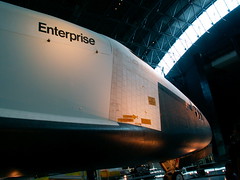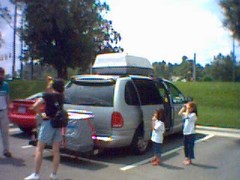Saturday, July 30, 2005
NY State Thruway
Posted by
Michael Stiber
|
7/30/2005 08:32:00 PM
|
0
comments
|
![]()
Wednesday, July 27, 2005
Trip mascot
Posted by
Michael Stiber
|
7/27/2005 06:35:00 AM
|
0
comments
|
![]()
Friday, July 22, 2005
The best museum
Posted by
Michael Stiber
|
7/22/2005 08:04:00 PM
|
0
comments
|
![]()
Thursday, July 21, 2005
An open letter to Bill Gates
I read with interest a recent Computerworld article, which discusses your worries with respect to declining enrollment in computer science degree programs in the United States. As a computer science faculty member in the closest CS department to Redmond, this is a topic which is also close to my own heart.
Let's face it, unless things have changed drastically in Redmond while I've been away this past year, your technical employees (and those of other companies; this is not unique to Microsoft) put in far more than 40 hours per week. It doesn't matter how interesting that work is; I submit that there is something wrong with an industry that expects its workers, as a permanent state of affairs, to work more than the accepted standard work week. And I think students agree with this and are voting with their feet.
I understand that changing this would have an impact on your company's productivity. However, I also understand that you have been pushing, along with other industry leaders, for increased immigration quotas for technology degree holders. Don't you see that this might be viewed in an adversarial fashion by prospective CS majors? That they would perceive the primary motivation behind this a removal of pressure from technology companies to provide real fixes to CS workers' quality of life? It's true that immigration provides great benefits to universities, companies, and US society, as some of the best and brightest from around the world come here. But there is a difference between bringing in some people to enhance an organization and wanting to bring enough to materially affect the work environment.
In closing, I think that you have an opportunity to set an example and show that your interest here is not merely Microsoft's bottom line -- that you really have a concern for the long-term health of the computing profession and the student pipeline. Why don't you make the 40-hour work week official Microsoft policy, and back it up with measures such as official comp time? Why not evaluate managers poorly if their teams consistently put in more that 40 hours/week on average? Why not put other teeth behind this, to ensure that hours are accurately accounted and that comp time is actually taken? Just because an employee feels that life away from work is important doesn't mean that that employee isn't serious about his or her career. Those are the people who are more like your typical user: the people who may understand how to, as you say, "make things simpler".
Topics: careers, computer science.
Posted by
Michael Stiber
|
7/21/2005 10:27:00 PM
|
6
comments
|
![]()
Google Moon - Lunar Landing Sites
Yet another example of how inventive a company Google is. Go to the link from the title above. For fun, zoom all the way in.
Posted by
Michael Stiber
|
7/21/2005 10:21:00 PM
|
0
comments
|
![]()
Welcome Skeptics!
The thirteenth Skeptics' Circle is being held at Respectful Insolence, and I am participating via the article linked above. I hereby provide this post for your commenting convenience, as the above-linked post already has a few long ones.
Posted by
Michael Stiber
|
7/21/2005 09:48:00 PM
|
0
comments
|
![]()
Wednesday, July 20, 2005
A day of mourning for all engineers: James Doohan 1920-2005
Although he may only have played one on TV, James Doohan's portrayal of Montgomery Scott on Star Trek was an inspiration for many of us when we were forming our visions of what we would do with our lives. If you're an engineer, the next time you need to make an emergency design revision, I hope you'll add a comment in the documentation: "This one's for you, Mr. Doohan".
Posted by
Michael Stiber
|
7/20/2005 08:48:00 PM
|
0
comments
|
![]()
Motel blogging
Posted by
Michael Stiber
|
7/20/2005 08:02:00 PM
|
0
comments
|
![]()
Myth of for-profit schools' CS degree programs spreads
I blogged previously about a report from the American Association for the Advancement of Science (AAAS), which, among other things, states that two for-profit "universities" produced the most CS degrees in 2001. The report has now been picked up by MSNBC (link from title above). I pointed out a number of problems that this report has, in my opinion. The biggest one is this: the two schools mentioned don't even offer CS degrees.
Topics: academia, computer science, information technology.
Posted by
Michael Stiber
|
7/20/2005 07:28:00 PM
|
0
comments
|
![]()
Sunday, July 17, 2005
Traveling light
Posted by
Michael Stiber
|
7/17/2005 06:50:00 PM
|
0
comments
|
![]()
Friday, July 15, 2005
On the road again
Well, all good things must come to an end. In this case, it is the end of a sabbatical. Most of the pain of packing is done -- the minivan is as dense as a neutron star. Now comes the drive from Gainesville to Seattle, with a stop in Montreal for a conference. Expect intermittent blogging, hopefully without any stories about en route transmission rebuilds (that was part of the trip at the start of the sabbatical; Chrysler transmissions leave a bit to be desired).
Posted by
Michael Stiber
|
7/15/2005 04:56:00 AM
|
0
comments
|
![]()
Monday, July 11, 2005
U.S. losing lead in science and engineering?
Note that this is talking about all engineering graduates, not just CS, and so it is comparing a currently stable US output with rising outputs in other countries. This is not surprising, considering that:
The study said deteriorating opportunities and comparative wages for young science and engineering graduates has discouraged U.S. students from entering these fields, but not those born in other countries.So, what is to be done? Produce more graduates to compete for fewer opportunities and lower wages? It doesn't seem that the report suggests this action; at least, the Reuters article doesn't mention it, and the wording is strange, in that the action urged above is to prevent the decreasing share from undermining US economic leadership, not to prevent the share itself from decreasing. The report's abstract has the following closing sentence:
To ease the adjustment to a less dominant position in science and engineering, the US will have to develop new labor market and R&D policies that build on existing strengths and develop new ways of benefitting from scientific and technological advances in other countries.This seems purposefully vague. Is there something more concrete in the report? Is this code for something that would be obvious to an economist, such as increasing immigration quotas? Anyone want to know badly enough to spend $5 to find out?
Personally, I am skeptical that this will be as much of a crisis as is advertised. Of course the number of engineering graduates in China, for example, will increase greatly in the years to come, and so of course the US share of graduates will decrease. However, the cost of living in major Chinese cities already rivals or exceeds comparable US cities. For example, new condos in the outskirts of Guangzhou can cost well over US$100,000. Chinese engineering graduates aren't stupid. They didn't work like crazy to beat incredible odds to get their degrees to live in third world conditions someplace in the boondocks -- they want comfortable lives in the big cities. I don't imagine that the situation is all that different in India. So, the cost advantage of offshoring will be transitory: enough to jump start high-tech industries in developing countries, but insufficient to do permanent damage to the US engineering profession.
Topics: engineering, profession, careers, globalization.
Posted by
Michael Stiber
|
7/11/2005 07:09:00 PM
|
2
comments
|
![]()
Saturday, July 09, 2005
The trouble with Tribble
The title of this post refers to an article in the Chronicle of Higher Education by an author writing under the pseudonym of "Ivan Tribble". Prof. Tribble is a humanities professor at a small liberal-arts college in the Midwest, and he writes about the trouble his hiring committee has had finding new faculty who don't have blogs. It seems that they've concluded that faculty who blog "might air departmental dirty laundry (real or imagined) on the cyber clothesline for the world to see. Past good behavior is no guarantee against future lapses of professional decorum." Of course, this is ridiculous; as Dan Drezner points out: just a few mouse clicks, and anyone can have a blog.
Back when I was a grad student, blogs were called "Usenet newsgroups". All us computer geeks hung out there. As far as I can tell, the only negative impact was on our research productivity. Or, maybe it helped; who knows?
I'll close with this remark from Prof. Tribble:
...we can't afford to have our new hire ditching us to hang out in computer science after a few weeks on the job.I'm not surprised that his department is wary of new faculty developing interdisciplinary interests. After all, don't we all want to be in academia so we can lock ourselves in our offices, with occasional forays to department-only talks for social events?
Other blogs commenting on this include: Planned Obsolescence, who serves up a much more detailed flame than I have patience for, One Man's Opinion, who points out that what Prof. Tribble is really arguing for is dishonesty: hiding information from search committees (and search committees not wanting to find out things about candidates that would make their jobs tougher), Robert Farley, who points out that Tribble is confusing the purpose of different media, and Bitch, Ph.D., who does what she does best (i.e., space-efficient mockery).
P.S. This whole issue actually never occurred to me until I read this Chronicle article. Perhaps it's the case that only fields like computer science, in which computers and the net are places for doing many non-job-oriented things, have such a relaxed view of things like blogging?
Posted by
Michael Stiber
|
7/09/2005 09:59:00 PM
|
0
comments
|
![]()
Friday, July 08, 2005
The Church's curious op-ed and ID an admitted religious belief
There's been a fair amount of discussion of the opinion piece by Christoph Schönborn, the Roman Catholic cardinal archbishop of Vienna, in the July 7 New York Times (linked above; also available in the July 8 International Herald Tribune). In this article, Cardinal Schönborn appears to be laying the ground for the new Pope to distance the Church from his predecessor's accommodating, though somewhat ambiguous, stance on evolution. Now that there's been a fair amount of comment on other blogs and my migraine has gone away, I thought I'd comment on the situation. Note that, since I'm not a Catholic, my reading of Church officials' statements is that of an outside.
3. ...I would like to remind you that the Magisterium of the Church has already made pronouncements on these matters...So, John Paul noted his predecessor's statement that evolution and the Church are not incompatible (essentially, I believe, he said that it was permissible for Catholics to work in evolutionary sciences). The two conditions that he cited were that evolution not be accepted as definitively proven and that no claim be made that the human soul arises merely from the material world -- that the creation part that God enters into is the creation of each person's soul.In his Encyclical Humani generis (1950), my predecessor Pius XII had already stated that there was no opposition between evolution and the doctrine of the faith about man and his vocation, on condition that one did not lose sight of several indisputable points...
4. ...the Encyclical Humani generis considered the doctrine of "evolutionism" a serious hypothesis, worthy of investigation and in-depth study... two methodological conditions: that this opinion should not be adopted as though it were a certain, proven doctrine and as though one could totally prescind from Revelation with regard to the questions it raises. He also spelled out the condition on which this opinion would be compatible with the Christian faith...
Today... It is indeed remarkable that this theory has been progressively accepted by researchers, following a series of discoveries in various fields of knowledge. The convergence, neither sought nor fabricated, of the results of work that was conducted independently is in itself a significant argument in favour of this theory...
5. The Church's Magisterium is directly concerned with the question of evolution, for it involves the conception of man... the human individual cannot be subordinated as a pure means or a pure instrument, either to the species or to society... St. Thomas observes that man's likeness to God resides especially in his speculative intellect... It is by virtue of his spiritual soul that the whole person possesses such a dignity even in his body. Pius XII stressed this essential point: if the human body takes its origin from pre-existent living matter the spiritual soul is immediately created by God...
Consequently, theories of evolution which, in accordance with the philosophies inspiring them, consider the mind as emerging from the forces of living matter, or as a mere epiphenomenon of this matter, are incompatible with the truth about man. Nor are they able to ground the dignity of the person.
John Paul appears to relax Pius XII's statement on the unproven nature of evolution, noting the independent evidence for it from numerous fields. So, what he appears to be saying is that, if one accepts that mind is not produced solely as the result of the action of matter and that individuals' roles are not merely that of a cog in an evolutionary machine, then it is acceptable for Catholics to consider evolution to be a well-supported scientific theory. Since evolution makes no statement about the soul nor of the purpose of individual organisms, this presents a very accommodative stance on the part of the Church. My interpretation appears to be supported by this web page, written by Michael J. Ghedotti, an Associate Professor of Biology at Regis University (he also summarizes the relationship between evolution and a number of other religions).
Now we come to Cardinal Schönborn's op-ed piece.
EVER since 1996, when Pope John Paul II said that evolution (a term he did not define) was "more than just a hypothesis," defenders of neo-Darwinian dogma have often invoked the supposed acceptance - or at least acquiescence - of the Roman Catholic Church when they defend their theory as somehow compatible with Christian faith.He then goes on to minimize the importance of John Paul's 1996 address and pick other statements by him to support his thesis that evolution is guided by God. I think he is being very clear here, and is formally aligning the Church with the intelligent design crowd.But this is not true. The Catholic Church, while leaving to science many details about the history of life on earth, proclaims that by the light of reason the human intellect can readily and clearly discern purpose and design in the natural world, including the world of living things.
Evolution in the sense of common ancestry might be true, but evolution in the neo-Darwinian sense - an unguided, unplanned process of random variation and natural selection - is not. Any system of thought that denies or seeks to explain away the overwhelming evidence for design in biology is ideology, not science.
It is my understanding that, at some level, the official positions of the Church are considered eternal and infallible. Understandably, this makes Church leaders hesitant to make swift decisions or unambiguous statements. Even the cardinal's statement is not unambiguous. However, the gist of his writing is that while common descent may be true, the driving force behind evolution is not random, it is intelligent (and supernatural). This is much more restrictive than what John Paul said -- he place no such restriction on the mechanism of physical evolution -- and it certainly appears that he is laying the groundwork for Benedict XVI to, maybe not repudiate, but reinterpret the Church stance away from a focus on the special creation of the human soul and towards divine intervention in the ongoing processes of life. If you read this article, you may decide that this is mostly a subtle change of wording rather than a truly substantive change of policy.
A might be expected, the wackos at the "Intelligent Design" Institute are spinning this as a major victory. This is nonsense, and in fact ID's advocates' statements give the lie to their assertion that ID is science. If ID were science, then the Catholic Church's position would be irrelevant. The validity of scientific theories is not affected by the support of authorities or organizations -- it is supported only by evidence. By citing the op-ed piece as support for ID, these folks are in fact admitting that ID is a religious belief, and not science.
Other blog postings relating to this include: Chris C. Mooney, The Panda's Thumb, Red State Rabble, and SciAm Perspectives.
Topics: evolution, religion, Catholicism, creationism, intelligent design.
Posted by
Michael Stiber
|
7/08/2005 02:54:00 PM
|
11
comments
|
![]()
Wednesday, July 06, 2005
Paul Graham: Hiring is obsolete
The title links to a May essay by Paul Graham on how smart computer science undergraduates may find jobs in the future. Actually, he's even talking about the present, to some extent. His main thesis is that it's very difficult for companies to evaluate the worth of new, inexperienced employees. Their main solution is to not value them very highly, make them do low-level tasks to start with the assumption that the smart ones will rise to the top (which, if you read Paul's other essays on high school, for example, you'll recognize as wishful thinking, as the really smart ones get bored and tune out or leave), or bypass them entirely for people with experience.
The phenomenon he observes is the purchasing of small startup companies: companies started by new graduates that show interesting ideas, hold valuable technology, and showcase the founders' talents. He notes that, today, startup costs (for software companies, at least) are basically just subsistence for the founders, and that most startups are bought outright when they are fairly new. His conclusion is that they are purchased to access the founders' talents and for whatever technology they've already developed, thus solving the problem of identifying talent (already proven) and developing innovative new products (already done). The premium paid for the startup is then a signing bonus. And even failure can be rewarding. Here's the money quote:
I asked managers at Yahoo, Google, Amazon, Cisco and Microsoft how they'd feel about two candidates, both 24, with equal ability, one who'd tried to start a startup that tanked, and another who'd spent the two years since college working as a developer at a big company. Every one responded that they'd prefer the guy who'd tried to start his own company. Zod Nazem, who's in charge of engineering at Yahoo, said, "I actually put more value on the guy with the failed startup. And you can quote me!"This interests me because of the idea of undergraduates developing portfolios of their work, which is a formal or informal component of many undergraduate programs. A startup company is essentially a public portfolio of your work. In a job environment that's still somewhat difficult for new grads, this can be a way to stand out, if you've got the wherewithal to live without a paycheck for a while (and an interesting idea wouldn't hurt).
Topics: computer science, education, entrepreneurship.
Posted by
Michael Stiber
|
7/06/2005 04:53:00 PM
|
0
comments
|
![]()
Tuesday, July 05, 2005
Weeder course humor
Over at Ernie's 3D Pancakes (linked from title) resides some college weed-out course humor (at the expense of premed students). I remember, along with other engineering undergrads, torturing the premeds in physics class. Anyway, this reminded me of a story by a doctor friend of mine. The setting is a first-year med school class (I forget the subject). Professor is dealing with a clueless med student: "Here's a quarter. Call your mother. Tell her you're not going to be a doctor."
Compared to that, the weeder-course humor seems kind and gentle, doesn't it?
Posted by
Michael Stiber
|
7/05/2005 05:03:00 PM
|
0
comments
|
![]()
Monday, July 04, 2005
Welcome to The Academy
I'm now part of The Academy, a new TTLB Community created at the request of Dr. Steven Taylor at PoliBlog. Basically, it's an index of blogs written by university faculty. It also has some interesting features, such as lists of articles that are most linked to within the community and most recently updated (which seems to miss posts). It also ranks the member blogs by number of links within the community.
Posted by
Michael Stiber
|
7/04/2005 12:08:00 PM
|
0
comments
|
![]()
Sunday, July 03, 2005
Best science podcasts
Not science at all
I won't even both linking to "Consciousness: The Inside Story," which is produced by the Maharishi University of Management, the transcendental meditation (TM) people. TM might be a helpful relaxation method, and most of us can certainly use a bit of relaxation, but it has nothing to do with quantum physics (at least, nothing more than anything else in the world). What they have to say about neuroscience or consciousness isn't science, either. All this is probably best left to a Skeptics' Circle contribution.
"The infidel guy show" (iTunes) is a mixture of all sorts of things, including some science, but also lots of other stuff, mostly skepticism about religion. The detailed information about it in the iTunes Store lists it under "Religion & Spirituality", so I don't know why it is under "Science" in category browsing mode.
"International House of Dancakes" (iTunes) seems to contain science-themed original music from the podcaster. Or maybe it's just mis-filed.
For some reason, some local radio weather forecasts are classified under science. These include the "K8 WeatherTALK Podcast" and the "Kansas City Weather Podcast".
The "MAKE Magazine Podcast" (iTunes) has a strange title; perhaps the folks who added it to the iTunes Music Store messed up. It's from O'Reilly and Associates and focuses on seriously geeky software development. An interesting tech podcast, but it's not science.
The "Matamea Podcast" (iTunes) is a science fiction podcast about a fictional world, I guess invented by the podcaster.
Low signal-to-noise ratio
I like to talk as much or more than the next guy, but that doesn't mean I like to listen to other people nattering on.
"BeachCast" (iTunes) has some science content, mostly things like interviews with volunteers at a marine mammal care center. I thought about putting this under "not science," but there is some science there. If you like more personal podcasts and aren't searching for a lot of real science content, then you may like this. (You can tell I got a "good vibe" about the people making this and wanted to say something nice about it. Not really my cup of tea.)
"Berkeley Groks" (iTunes) is a weekly radio program from Berkeley, California. Not really bad, but lots of jabbering from the hosts.
"Dr. Karl podcast - from triple j" (iTunes) from Australian "youth radio". Jabber, jabber, jabber, tidbit, jabber, jabber, jabber.
"Slanderbox Media" (iTunes) has a combination of science and other shows. I don't have the patience to manually delete the shows I don't want to listen to.
"SWAOG Amateur Astronomy Network" (iTunes) is for and by amateur astronomers. Recorded off of ham radio. Pretty much an in-group discussion.
Honorable mentions
Because there's only so many minutes in a run, I don't subscribe to these. They're not bad, they just didn't make my cut to be added to my iPod.
"Singularity Podcast" (iTunes) is focused on answering emailed in listener questions and current events in physical science. Fairly basic information (that may be good or bad, depending on your preferences).
The Great Lakes Radio Consortium (formerly part of US public radio) produces the "GLRC.org Weekly News Report" (iTunes) focusing on environmental news, with some regional emphasis on the Great Lakes region of the US (Michigan and Ontario primarily, it seems). Very much a professional-quality newscast, which means lots of short segments.
"Radio Frontier Channel" (iTunes) is quite interesting. It's a mixture of shows about science and shows about scientists (interviews, not historical). I have provisionally subscribed to it, but I suspect that I won't listen to it very often because of its length (seems to be typically an hour long).
"Regulus! The Astronomy Newsletter" (iTunes) is for amateur astronomers, talking about what can be seen in the night sky. If I were an amateur astronomer, I'd be more interested in this. Maybe when the kids are older and stay up later? Who am I kidding, by then they won't be interested in star watching with their old man.
"Science Friday" (iTunes) is a well-known US National Public Radio program. It's wide-ranging in scope, but the shows are hit-or-miss as far as my interests are concerned, and they're long.
"Sciencecast.net" (iTunes) is an amateur science podcast from Germany (in English). It's not clear to me how much of the commentary is from personal knowledge and how much is read from other sources. Part of that feeling may come from hearing someone talk in a second language. It also includes snippets from radio shows and podcasters from around the world. In my opinion, those inclusions could be more selective. A good portion of the content is really tech, rather than science.
"Skepticality - Science and Skeptical Thought" (iTunes) interviews people like The Amazing Randi and Phil Plait at Bad Astronomy. Not in my core interest area, maybe a bit long at around 45 minutes per show, and uneven in terms of first-person expertise, it's unlikely to stay permanently in my subscription list.
"The Science Show" (iTunes) is from Australian ABC radio. Not bad; shows are a bit under an hour long. I put it here simply because there are other shows I prefer that are shorter.
"The Space Show" (iTunes) is an interview show about space development. It can be interesting, but is invariably quite long.
"theWatt" (iTunes) has both a mini and full-length podcast about energy and related topics. Fairly basic stuff. The links are to the mini podcast.
"This week in science" (iTunes) is similar to Slacker Astronomy, but with a broader scope. It's recorded from a radio program, with phone calls from live listeners. The biggest effect of it being a radio program is time overhead and chattiness. I want to like this show more, but there's just too much extra talk.
"Wanhoffs Wunderbare Welt der Wissenschaft" (iTunes) is in German, despite being listed in the iTunes Music Store as being in English. I put it here as an act of faith, as it is from the Fraunhofer Institut, which are well-respected research institutes in Germany.
The good stuff
To make my cut, shows had to have a high information-to-time content. Here they are, in no particular order.
I listed "Science@NASA" (iTunes) as one of the best podcasts there are. Short and filled with information, right from the source. I wish they'd improve their sound quality a bit, though.
From Canada, there's "Quirks & Quarks" (iTunes), CBC Radio's Weekly Science Radio Program. It covers all sorts of topics, usually including university faculty and listener questions in at least part of the show. The also have a weekly email newsletter.
From Australia, "All In The Mind" (iTunes) from Radio National focuses each week on brain and behavioral sciences. Recent topics include Alzheimer's disease and hysteria.
The US National Public Radio podcasts its weekly show, "Living on Earth" (iTunes), which focuses on environmental issues. They also have a weekly email newsletter, and an information-rich web site.
"EarthNews Radio" (iTunes) is a 90-second program from the Environmental News Network. An eclectic (and brief) podcast.
"EarthWatch Radio" (iTunes) is from the University of Wisconsin and focuses on earth, ocean, environment science, and global climate change. Five, roughly 2-minute, shows per week.
"SETI Podcast" (iTunes): who wouldn't listen to a science podcast from the SETI Institute?
"Slacker Astronomy" (iTunes) is just great fun. Lots of information and fun to listen to, this should serve as proof that amateur podcasts can be as good as any the professionals do.
"Stardate" (iTunes) should be familiar to many US National Public Radio listeners. Short, single-topic shows written by the folks at the University of Texas McDonald Observatory.
"Universe Today" (iTunes) has some good astronomy interviews and the show is tight at less than a half hour each (many around 10 minutes).
Posted by
Michael Stiber
|
7/03/2005 10:02:00 PM
|
3
comments
|
![]()
Friday, July 01, 2005
Chicago Tribune: Professor sued over anti-aging comments
See the article linked from the title. If scientists need to start worrying about the consequences of criticizing pseudoscience, then we're truly headed for the dark ages. Bloggers (especially those who contribute to the Skeptics' Circle) beware, too!
Posted by
Michael Stiber
|
7/01/2005 07:48:00 AM
|
1 comments
|
![]()










